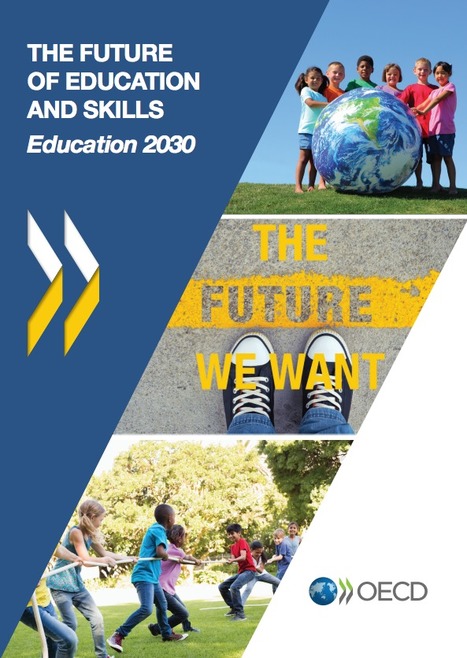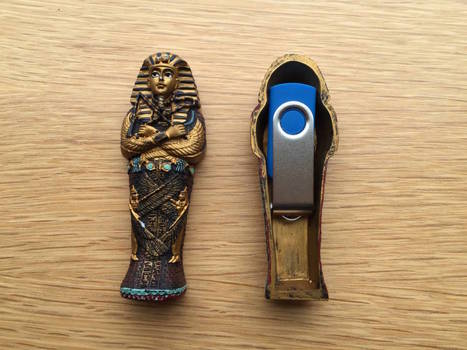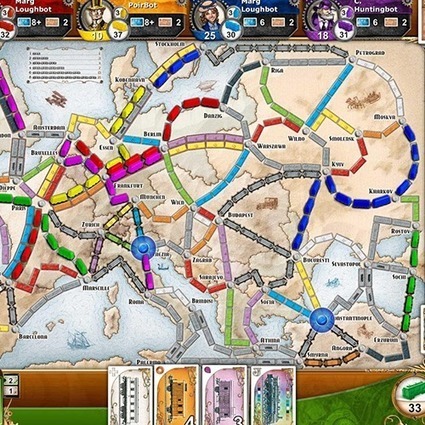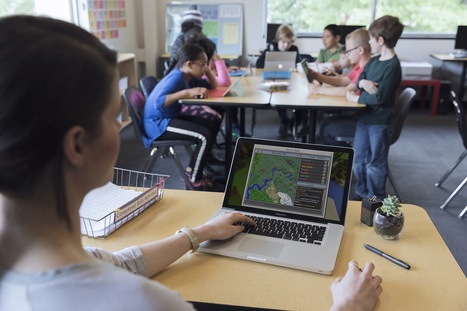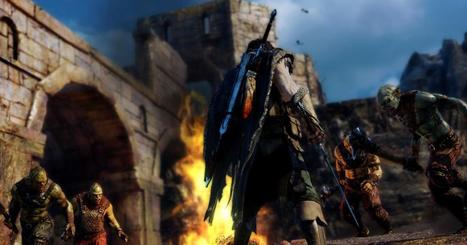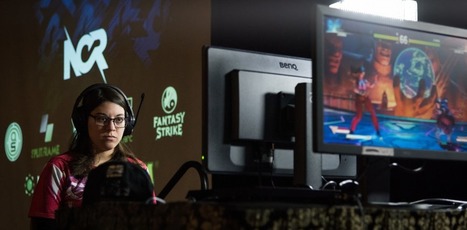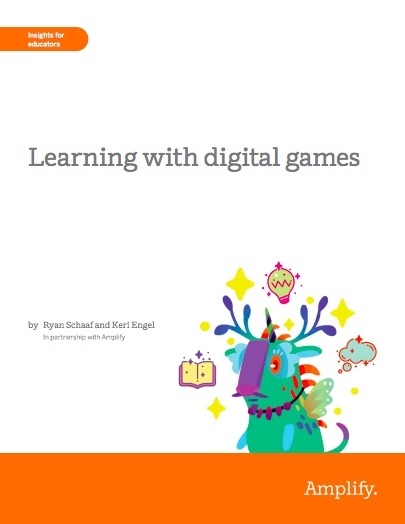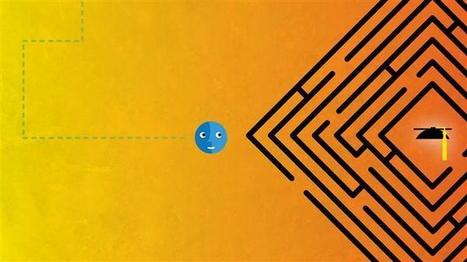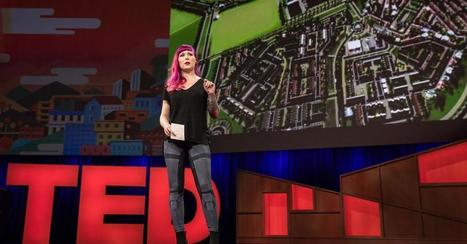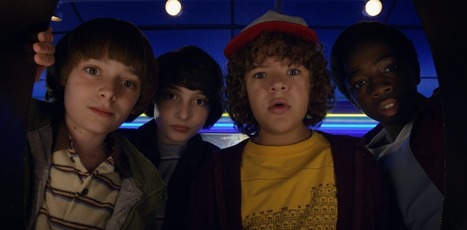 Your new post is loading...
 Your new post is loading...

|
Scooped by
Kim Flintoff
October 16, 2018 7:08 PM
|
Ken Wong reckons games can take you on the same emotional journey as a book or a film — and can even make you cry.

|
Scooped by
Kim Flintoff
September 28, 2018 11:14 PM
|
Now that esports is in high schools across the country, your teen gamer can justify gaming as “training” -- and maybe even win a college scholarship. Advice from Common Sense Media editors.

|
Scooped by
Kim Flintoff
September 10, 2018 9:18 PM
|
This OECD Learning Framework 2030 offers a vision and some underpinning principles for the future of education systems. It is about orientation, not prescription. The learning framework has been co-created for the OECD Education 2030 project by government representatives and a growing community of partners, including thought leaders, experts, school networks, school leaders, teachers, students and youth groups, parents, universities, local organisations and social partners. This is work in progress and we invite you to join us in developing future-ready education for all.

|
Scooped by
Kim Flintoff
September 8, 2018 5:12 AM
|
To ensure that students learn about online privacy and data security, high school English language arts teachers John Fallon in Connecticut and Paul Darvasi (who also reports for MindShift) in Toronto co-created Blind Protocol, an alternate reality game. ARGs blend fiction with the real world by creating narratives and puzzles that take participants deeper into the story by way of their actions. Fallon and Darvasi’s ARG goal was not to inform students on how to actually hack or spy; rather, they use game tactics to teach about the vulnerability of their data.

|
Scooped by
Kim Flintoff
July 30, 2018 6:37 AM
|
Highlights
• A randomised controlled trial was used to assess effects of playing video games.
• Previously validated self-report instruments were used to measure graduate skills.
• Game play improved student communication skill, resourcefulness and adaptability.
• Video games may have a role to play in higher education.

|
Scooped by
Kim Flintoff
June 14, 2018 7:45 PM
|
At Bottom-Line Performance, we have a “learning game design peer group” that meets a few times per year. I started the group three years ago to help build game design skills and to foster deeper knowledge of the power of games as learning tools. People who design games need to play games to gain perspective and understanding of core dynamics, game mechanics, and game elements and how these all weave together to create a good or poor game experience.
Here are three great games we have played within our peer group. All three are commercially available; one is marketed explicitly as a learning game. I’ve made a few comments about each one to help people understand the value of playing and evaluating the game design of each one

|
Scooped by
Kim Flintoff
June 5, 2018 6:08 PM
|
People who pursue the "Settlement Generation Challenge" are being asked to write adaptive code that will on its own create a settlement for a given, unknown Minecraft map. Then, during the evaluation process, submitted algorithms will be run on three other previously unseen maps. The results will be judged not by a computer but by humans: a panel of experts that includes game designers, urbanists and architects. The judging criteria: adaptation to the environment (for example, does the settlement take advantage of the terrain?), functionality (does it keep mobs out?), narrative integration (could somebody looking at the settlement describe how it's different from other settlements?) and visual aesthetics (does it look believable?).

|
Scooped by
Kim Flintoff
April 13, 2018 8:29 PM
|
The researcher demonstrates Rushdie’s own experience with videogames as a way to stay occupied during his exile and as a way to stay connected with his sons (Rushdie dedicated Luka to his youngest son, Milan). Through quotations from Rushdie, the researcher shows his explicit interest in experimenting with the structure of videogames for storytelling. The author points out that videogames are especially relevant for storytelling, because users create their own characters and narratives within the game. The reader might recognize tropes such as characters creating their own fictions, multi-level challenges, temporality of death, and allusions to a variety of world mythologies, cultures, and religions, not only from video games, but also from other novels in the literary gaming genre, such as works by Orson Scott Card and Suzanne Collins.
Educators around the world are using Minecraft: Education Edition to teach concepts like coding, reimagining fairy tales, building habitable colonies on Mars and modeling renewable sources of energy. As educators begin to explore ways to use Minecraft to create richer and deeper learning experiences, we turned to some of Global Minecraft Mentors to garner tips …

|
Rescooped by
Peter Mellow
from Educational Leadership
February 8, 2018 8:53 PM
|
Videogames offer a range of educational benefits in English classrooms, University of Melbourne research has discovered.

|
Scooped by
Kim Flintoff
February 1, 2018 8:35 AM
|
Practical barriers can keep the most enthusiastic teacher from using games in the classroom. Let’s get real — and realistic — about ways to approach game-based learning for the classroom. Teachers are busy, and usually spend much of a given school day completing work from that day while simultaneously preparing work for the next day.
So how, then, do teachers find the games to use in class, play the entire game to understand what and how it teaches, and review best practices? Often, they don’t. Here’s a more realistic approach to using the power of game-based learning in the classroom.

|
Scooped by
Kim Flintoff
January 16, 2018 5:39 PM
|
One of the things that I emphasize to students before they embark on any kind of research or problem-solving task is to take a good long look at the information that they already have before them. To that end, I'll often request that they construct a list of what they know about a topic or problem before they begin to search. Playing one of the following three Google Maps-based games is a fun way to reinforce the concept of using prior knowledge and observations.
New research shows your ability to play certain computer games is linked to your intelligence.
|

|
Scooped by
Kim Flintoff
October 14, 2018 1:13 AM
|
Abstracts due by Thursday October 18th, 2018
Computer, video, mobile and digital games are fundamentally geographical: They are sites of social relation, spaces of exploration and agency, cultural and political representations of places, affective experiences and are developed through globalised and globalising technologies and networks.
This session welcomes geographers, digital scholars, creative practitioners, and others who are approaching games as spatial phenomena. Though games have been used as geographical field sites and case studies for some time, this session will provide an opportunity to bring together diverse empirical and theoretical responses to games and to focus on the specific geographies and spatialities of games.

|
Scooped by
Kim Flintoff
September 18, 2018 8:26 AM
|
Video games are to be introduced into UK schools as they can help reduce violence in young people, researchers have found.

|
Rescooped by
Kim Flintoff
from Into the Driver's Seat
September 10, 2018 9:16 PM
|
Via Edchat Interactive "Ryan Schaff and Keri Engel just published a free Learning with Digital Games white paper. It contains instructions on what successes teachers and students are having with Digital Games, how they can be, and are, integrated in curriculum, and compare and contrast the various platforms digital games are played on and their potential for individual, small-group, or large-scale digital gamebased learning implementation."
Via Jim Lerman

|
Scooped by
Kim Flintoff
September 8, 2018 5:11 AM
|
Many children enjoy playing video games, yet they offer distinct challenges and opportunities arising from their ability to tell stories, invite participation, create imaginary worlds and connect players.

|
Scooped by
Kim Flintoff
June 20, 2018 11:55 PM
|
Gameful design embraces incremental implementations of proven intrinsic motivators while it acknowledges, accentuates, and builds on the work that good instructors do as second nature.

|
Scooped by
Kim Flintoff
June 13, 2018 1:15 AM
|
Victorian government school students will have access to a classroom version of the popular game Minecraft, created to immerse students in various Minecraft worlds to promote creativity, problem solving, critical thinking and collaboration.

|
Scooped by
Kim Flintoff
May 25, 2018 1:20 AM
|
Celebrating diversity and inclusivity in games and gaming communities

|
Scooped by
Peter Mellow
March 14, 2018 9:23 PM
|
In an era of rapid technological change, experimentation, and innovation, four tools can help higher education leaders decide where to invest their ti

|
Scooped by
Peter Mellow
March 6, 2018 6:37 PM
|
With more than half of the world population living in cities, one thing is undeniable: we are an urban species. Part game, part urban planning sketching tool, "Cities: Skylines" encourages people to use their creativity and self-expression to rethink the cities of tomorrow. Designer Karoliina Korppoo takes us on a tour through some extraordinary places users have created, from futuristic fantasy cities to remarkably realistic landscapes. What does your dream city look like?
New gaming headsets promise to seamlessly integrate the digital and the physical world, but they also typically limit the vision of those digital objects to the person wearing the headset.

|
Scooped by
Kim Flintoff
January 17, 2018 7:28 PM
|
Frankenstein200 puts players in the middle of the action in a story where Mary Shelley’s classic tale collides with modern science. Perform experiments, explore hidden areas of research, and assist a pair of young scientists as they unravel a mystery in a cutting-edge digital experience.
Press the PLAY button to enter the world of Frankenstein200!
PLAY NOW!
This material is based upon work supported by the National Science Foundation under grant number 1516684. Any opinions, findings, and conclusions or recommendations expressed in this material are those of the author(s) and do not necessarily reflect the views of the National Science Foundation.
This special feature showcases a learner-controlled Articulate Storyline 3 eLearning course. The course uses game elements to simulate a learner's journey.
|



 Your new post is loading...
Your new post is loading...





